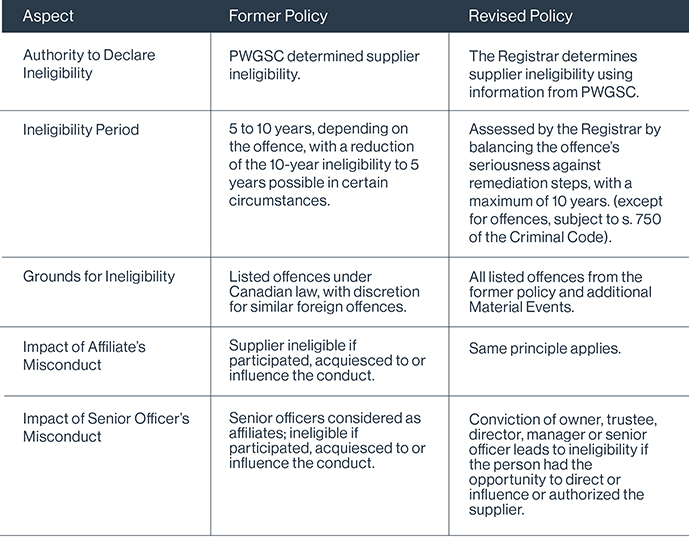Jan. 14, 2025 - Significant changes to the Québec consumer protection regime came into effect earlier this year. The president of the Office de la protection du consommateur (OPC), Québec’s consumer protection regulator, can now impose monetary administrative penalties (AMPs) for failing to comply with a large...
Updated “Ineligibility and Suspension Policy”: Are You at Risk of Losing Your Right to Contract with the Canadian Government?
The new policy provides for increased flexibility in the assessment of a supplier’s conduct, but targets a much broader range of situations triggering ineligibility
Introduction
The Government of Canada recently updated its “Ineligibility and Suspension Policy” (Policy). This revised policy, which was adopted by Public Works and Government Services Canada (PWGSC), has been effective since May 31, 2024, and contains significant changes that may impact many Canadian and foreign businesses.
Although the revised policy has introduced welcome flexibility to what was one of the most draconian integrity regimes in the world, it has also significantly expanded the circumstances in which a supplier may be debarred from doing business with the federal government.
Situations that may lead to ineligibility now include the following:
- a conviction or plea for certain provincial statutory offences, including insider trading, and certain offences under provincial lobbying statutes;
- an admission by the supplier or a civil judgment holding that the supplier engaged in conduct that would constitute certain federal offences subject to the regime;
- debarment by a provincial, international or foreign organization, as well as the conviction or suspension of an affiliate or of a director, senior officer or manager in certain situations;
- a violation of campaign contribution rules under the Canada Election Act; and
- a conviction for offences under federal environmental legislation for conduct that is found to be serious, repetitive or otherwise egregious.
The Policy also continues to require suppliers to notify of any changes in any previously provided information, including of new charges or convictions related to themselves or their affiliates. Under the Policy, these changes must be disclosed within 10 to 22 business days, depending on whether or not a contractual arrangement is ongoing. Providing a certification or declaration under the Policy that is false or misleading in a material respect triggers ineligibility.
Suppliers that have been or are dealing with regulatory or criminal issues, or that have an affiliate or a senior officer in such a situation, will want to understand the implications of this new regime.
Analysis
Background
The Policy was adopted to protect and safeguard the use and expenditure of public funds, ensure stewardship and transparency, and uphold public trust in Canada's contractual engagements.
The policy addresses unethical business behaviour that undermines fair competition, threatens market integrity, hampers economic growth, increases business costs and risks and erodes public confidence in government institutions. By adopting and updating this policy, the government aims to reduce instances of entering into or maintaining contracts with suppliers exhibiting such behaviour. The government is thereby reinforcing its commitment to transparency and ethical governance.
Increased Flexibility
The new regime replaces the previous policy’s mandatory 5-to-10-year period of ineligibility by introducing greater flexibility in determining the duration of ineligibility.
Instead of being automatically set, the duration of the ineligibility will be determined by a newly created Registrar of Ineligibility and Suspension, who is vested with significant discretionary powers.
In determining the length of a supplier’s ineligibility period, the Registrar will take into account the seriousness of the conduct engaged in, balanced against the steps taken by the supplier to ensure that similar conduct does not repeat itself. The more serious the conduct that resulted in the determination of ineligibility, the more comprehensive will the steps taken need to be. The Registrar will need to be convinced that the circumstances leading to the debarment have been addressed.
The Registrar may also temporarily suspend a supplier’s right to contract with PWGSC in certain circumstances, including where charges or proceedings are pending.
The Registrar may also, at any time and using its discretion, enter into an administrative agreement with a supplier. The administrative agreement will stay the ineligibility or suspension. It remains unclear at this time how the Registrar intends to administer the policy, and whether measures such as administrative agreements will be readily available for businesses that have properly addressed their regulatory issues.
The ineligibility period cannot exceed 10 years unless the supplier has lost its capacity to contract with the Canadian federal government under section 750(3) of the Criminal Code. This little-known provision provides that a person convicted for certain criminal offences (various types of conduct amounting to fraud against the government) loses its capacity to contract with the government until it has been restored by the governor in council. A modernization of this antiquated provision is more than overdue, but is beyond the adoption of a revised policy and would have required a vote in Parliament.
The introduction of increased flexibility in the revised policy will be welcomed by many who viewed the former policy as being too restrictive and not in line with international standards.
A Much Wider Scope
While it introduces flexibility in the determination of ineligibility, the Policy significantly expands the range of situations that will lead to a supplier becoming ineligible to contract with PWGSC and many other federal agencies applying the policy.
The revised policy sets out a broader list of “Material Events” leading to ineligibility, compared to the former policy. This broader list includes the circumstances which, under the former policy, automatically made a supplier ineligible.
Material Events that were also present in the former policy include the following offences, usually if they were committed within the past three years:
- offences subject to section 750 of the Criminal Code (false entry, certificate or return, fraud against His Majesty, frauds on the government and contractor subscribing to election fund, selling or purchasing political offices, fraud under section 380 committed against His Majesty, selling defective stores or procurement to His Majesty);
- offences of bribing an officer or judicial officer, extortion, forgery, fraudulent manipulation of stock exchange transactions, insider trading, falsification of books and documents, criminal breach of contract, secret commissions, money laundering or participation in activities of a criminal organization, all under the Criminal Code;
- failing to file a return or making a false or misleading statement in a return to the Commissioner of Lobbying under the Lobbying Act;
- conspiring, making arrangements between competitors, bid rigging, false or misleading representation or deceptive notice of winning a prize under the Competition Act;
- submission of false and deceptive statements under the Income Tax Act or the Excise Tax Act;
- bribing a foreign public official in or outside Canada under the Corruption of Foreign Public Officials Act;
- trafficking, importing, exporting or production of substances under the Controlled Drugs and Substances Act;
- entering into a subcontract with an ineligible first-tier subcontractor or failing to terminate a contract upon learning that a subcontractor is ineligible; and
- providing a false or misleading certification or declaration to PWGSC in a material respect.
- being convicted of, pleading guilty to, admitting to or being found (including by a civil court) to have committed certain foreign or provincial offences that would constitute certain offences under (a), (b) or (c) of the above list (the addition of provincial offences and admissions or findings by a civil court, are new);
- being convicted, or pleading guilty, under provincial securities legislation relating to fraud, collusion or insider trading;
- financing of terrorism or trafficking in persons under the Criminal Code;
- violating campaign contribution rules under the Canada Elections Act;
- offering or accepting a bribe under the Financial Administration Act;
- organizing entry into Canada or trafficking in persons under the Immigration and Refugee Protection Act;
- violating health, safety or hour and wage standards under the Canada Labour Code;
- being listed under or engaging in activities prohibited under regulations made pursuant to the United Nations Act, the Special Economic Measures Act, the Justice for Victims of Corrupt Foreign Officials Act or the Freezing Assets of Corrupt Foreign Officials Act.
- the Registrar determining in its discretion that contracting with the supplier may bring the federal procurement system into public disrepute, or that the supplier lacks integrity or business honesty, including if the supplier
- breached the Code of Conduct for Procurement in the past three years, or
- was declared ineligible in any provincial or foreign jurisdiction, or by an international organization;
- being convicted of an offence that results in the supplier being listed on the Environmental Offenders Registry (which contains information on convictions of corporations obtained under certain federal environmental laws) and, in the Registrar’s opinion, the conduct is serious, repetitive or otherwise egregious; and
- having received a poor performance evaluation under PWGSC’s Vendor Performance Management Policy that is, in the Registrar’s opinion, serious, repetitive or otherwise egregious.
The updated policy also introduces several new circumstances as Material Events or expands some that previously existed. These include the following events, usually if they occurred during the past three years:
In certain cases, including for an offence listed under (a), (b) or (c) above, the conviction or plea of an affiliate of the supplier may lead to ineligibility of the supplier if, in the Registrar’s opinion, the supplier participated in, acquiesced or assented to, directed or influenced or authorized the affiliate’s conduct.
Conviction for an offence listed under (a), (b) or (c) above or the suspension under the policy of an owner, trustee, director, manager or senior officer who, in the Registrar’s opinion, has the opportunity to direct or influence the supplier will also lead to ineligibility under the new policy.
Finally, the Policy continues to require suppliers to promptly notify of any changes in provided information, new charges, or convictions related to themselves or their affiliates. Specifically, for unexecuted agreements, notification is required within 10 business days, and for executed agreements, within 22 business days of the relevant change. Providing a false or misleading certification or declaration in a material respect triggers ineligibility. It is therefore crucial to adhere strictly to these requirements.
Summary of Key Changes

Conclusion
Steps can be taken to minimize the risk of conduct that violates the new policy. These steps include conducting a risk assessment, conducting internal audits, strengthening compliance programs and ensuring transparency in all business dealings. Experienced outside counsel should also be retained whenever an organization is dealing with regulatory issues to minimize the risk of averse consequences, including on the business’s ability to contract with the Canadian government.
Key Contacts
Related
July 26, 2024 - In its recent decision, Canada (Attorney General) v Power (Power), a divided Supreme Court of Canada (SCC) confirmed that a government can incur liability for damages under section 24(1) of the Canadian Charter of Rights and Freedoms (Charter) when Parliament or a...





